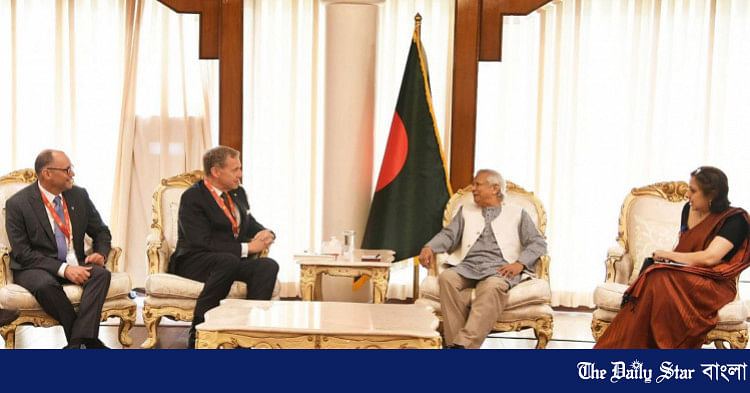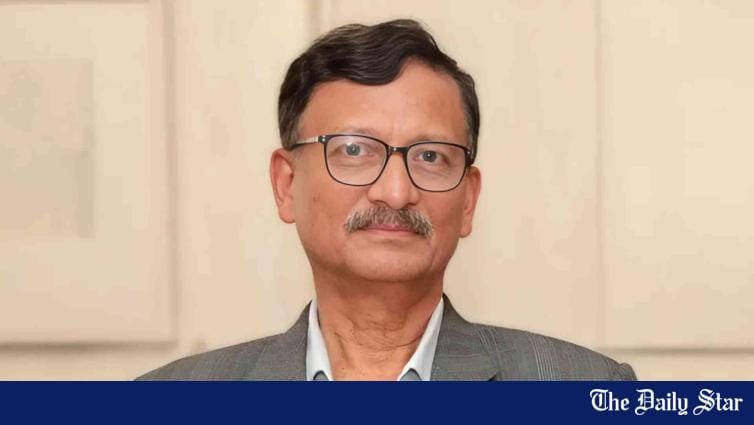Saif
Senior Member
- Joined
- Jan 24, 2024
- Messages
- 15,397
- Reaction score
- 7,874
- Nation

- Residence

- Axis Group


মার্কিন ব্যবসায়ীদের বাংলাদেশে আরও বিনিয়োগের আহ্বান প্রধান উপদেষ্টার
‘আপনার দায়িত্ব গ্রহণের পর থেকে আমেরিকান কোম্পানিগুলোর বাংলাদেশে আগ্রহ অনেক বেড়েছে।’
মার্কিন ব্যবসায়ীদের বাংলাদেশে আরও বিনিয়োগের আহ্বান প্রধান উপদেষ্টার
‘আপনার দায়িত্ব গ্রহণের পর থেকে আমেরিকান কোম্পানিগুলোর বাংলাদেশে আগ্রহ অনেক বেড়েছে।’

মার্কিন ব্যবসায়ীদের বাংলাদেশে আরও বিনিয়োগের আহ্বান জানিয়েছেন প্রধান উপদেষ্টা ড. মুহাম্মদ ইউনূস।
তিনি বলেন, অন্তর্বর্তী সরকার বিদেশি বিনিয়োগ আকর্ষণ এবং দেশের ব্যবসায়িক পরিবেশ উন্নয়নে বিভিন্ন পদক্ষেপ নিয়েছে।
ঢাকায় মঙ্গলবার রাষ্ট্রীয় অতিথি ভবন যমুনায় তিনি একটি মার্কিন ব্যবসায়ী প্রতিনিধি দলকে বলেন, 'আপনারা সঠিক সময়ে এ দেশে এসেছেন।'
এক্সিলারেট এনার্জির প্রধান নির্বাহী কর্মকর্তা (সিইও) এবং ইউএস-বাংলাদেশ বিজনেস কাউন্সিলের চেয়ারম্যান স্টিভেন কোবোসের নেতৃত্বে মার্কিন ব্যবসায়ী প্রতিনিধি দল এদিন প্রধান উপদেষ্টার সঙ্গে সাক্ষাৎ করেন।
অন্তর্বর্তী সরকারের নেতৃত্ব গ্রহণ করায় প্রধান উপদেষ্টার প্রশংসা করে স্টিভেন কোবোস বলেন, এটি বাংলাদেশে ব্যবসায় আস্থা বাড়াবে।
তিনি বলেন, 'আপনার দায়িত্ব গ্রহণের পর থেকে আমেরিকান কোম্পানিগুলোর বাংলাদেশে আগ্রহ অনেক বেড়েছে।'
কোবোস আরও জানান, ইউএস-বাংলাদেশ বিজনেস কাউন্সিলের সদস্যসহ শীর্ষস্থানীয় মার্কিন কোম্পানিগুলো দক্ষিণ এশিয়ার এই দেশে ব্যবসার সম্ভাবনা নিয়ে অনেক আগ্রহী।
তার কোম্পানি বাংলাদেশের জ্বালানি খাতে এবং কার্বন নিঃসরণ হ্রাসে আরও বিনিয়োগের পরিকল্পনা করছে, বলেন কোবোস।
তিনি বলেন, কোম্পানিটি দেশে তরলীকৃত প্রাকৃতিক গ্যাস (এলএনজি) সরবরাহ বৃদ্ধি করতে চায়। বর্তমানে এক্সিলারেট বাংলাদেশের দুটি অফশোর ফ্লোটিং স্টোরেজ এবং রিগ্যাসিফিকেশন ইউনিটে (এফএসআরইউ) বিনিয়োগ করেছে, যা প্রতিদিন এক দশমিক এক বিলিয়ন ঘনফুট গ্যাস সরবরাহ করে। দেশের দৈনিক গ্যাস সরবরাহের প্রায় ৩৪ শতাংশ এখান থেকে আসে।
সম্প্রতি মার্কিন যুক্তরাষ্ট্র সফরকালে প্রধান উপদেষ্টা ইউএস-বাংলাদেশ বিজনেস কাউন্সিলের একটি অনুষ্ঠানে বক্তব্য রাখেন। সেখানে এই সংগঠনের ৫০ জন সদস্য উপস্থিত ছিলেন, যার মধ্যে কিছু শীর্ষস্থানীয় আমেরিকান বহুজাতিক কোম্পানিও ছিল। ড. ইউনূস উপস্থিত মার্কিন ব্যবসায়ীদের বাংলাদেশে বিনিয়োগের আমন্ত্রণ জানান।
সাক্ষাৎকালে স্টিভেন কোবোসের সঙ্গে প্রতিনিধি দলে ঢাকায় যুক্তরাষ্ট্রের সাবেক রাষ্ট্রদূত পিটার হাসসহ এক্সিলারেট এনার্জির উচ্চপদস্থ কর্মকর্তারা ছিলেন। পিটার সম্প্রতি এক্সিলারেট এনার্জিতে স্ট্র্যাটেজিক অ্যাডভাইজার হিসেবে যোগ দিয়েছেন। এ ছাড়া, প্রতিনিধি দলে কোম্পানিটির ভাইস প্রেসিডেন্ট ডেরেক ওয়ং ও র্যামন ওয়াংডি এবং বাংলাদেশের আবাসিক ব্যবস্থাপক হাবিব ভূঁইয়া উপস্থিত ছিলেন।
সাক্ষাৎকালে প্রধান উপদেষ্টার এসডিজি বিষয়ক মুখ্য সমন্বয়ক লামিয়া মোরশেদ, বাংলাদেশ বিনিয়োগ উন্নয়ন কর্তৃপক্ষের (বিডা) নির্বাহী চেয়ারম্যান আশিক চৌধুরী ও জ্বালানি সচিব সাইফুল ইসলাম উপস্থিত ছিলেন।
‘আপনার দায়িত্ব গ্রহণের পর থেকে আমেরিকান কোম্পানিগুলোর বাংলাদেশে আগ্রহ অনেক বেড়েছে।’
মার্কিন ব্যবসায়ীদের বাংলাদেশে আরও বিনিয়োগের আহ্বান জানিয়েছেন প্রধান উপদেষ্টা ড. মুহাম্মদ ইউনূস।
তিনি বলেন, অন্তর্বর্তী সরকার বিদেশি বিনিয়োগ আকর্ষণ এবং দেশের ব্যবসায়িক পরিবেশ উন্নয়নে বিভিন্ন পদক্ষেপ নিয়েছে।
ঢাকায় মঙ্গলবার রাষ্ট্রীয় অতিথি ভবন যমুনায় তিনি একটি মার্কিন ব্যবসায়ী প্রতিনিধি দলকে বলেন, 'আপনারা সঠিক সময়ে এ দেশে এসেছেন।'
এক্সিলারেট এনার্জির প্রধান নির্বাহী কর্মকর্তা (সিইও) এবং ইউএস-বাংলাদেশ বিজনেস কাউন্সিলের চেয়ারম্যান স্টিভেন কোবোসের নেতৃত্বে মার্কিন ব্যবসায়ী প্রতিনিধি দল এদিন প্রধান উপদেষ্টার সঙ্গে সাক্ষাৎ করেন।
অন্তর্বর্তী সরকারের নেতৃত্ব গ্রহণ করায় প্রধান উপদেষ্টার প্রশংসা করে স্টিভেন কোবোস বলেন, এটি বাংলাদেশে ব্যবসায় আস্থা বাড়াবে।
তিনি বলেন, 'আপনার দায়িত্ব গ্রহণের পর থেকে আমেরিকান কোম্পানিগুলোর বাংলাদেশে আগ্রহ অনেক বেড়েছে।'
কোবোস আরও জানান, ইউএস-বাংলাদেশ বিজনেস কাউন্সিলের সদস্যসহ শীর্ষস্থানীয় মার্কিন কোম্পানিগুলো দক্ষিণ এশিয়ার এই দেশে ব্যবসার সম্ভাবনা নিয়ে অনেক আগ্রহী।
তার কোম্পানি বাংলাদেশের জ্বালানি খাতে এবং কার্বন নিঃসরণ হ্রাসে আরও বিনিয়োগের পরিকল্পনা করছে, বলেন কোবোস।
তিনি বলেন, কোম্পানিটি দেশে তরলীকৃত প্রাকৃতিক গ্যাস (এলএনজি) সরবরাহ বৃদ্ধি করতে চায়। বর্তমানে এক্সিলারেট বাংলাদেশের দুটি অফশোর ফ্লোটিং স্টোরেজ এবং রিগ্যাসিফিকেশন ইউনিটে (এফএসআরইউ) বিনিয়োগ করেছে, যা প্রতিদিন এক দশমিক এক বিলিয়ন ঘনফুট গ্যাস সরবরাহ করে। দেশের দৈনিক গ্যাস সরবরাহের প্রায় ৩৪ শতাংশ এখান থেকে আসে।
সম্প্রতি মার্কিন যুক্তরাষ্ট্র সফরকালে প্রধান উপদেষ্টা ইউএস-বাংলাদেশ বিজনেস কাউন্সিলের একটি অনুষ্ঠানে বক্তব্য রাখেন। সেখানে এই সংগঠনের ৫০ জন সদস্য উপস্থিত ছিলেন, যার মধ্যে কিছু শীর্ষস্থানীয় আমেরিকান বহুজাতিক কোম্পানিও ছিল। ড. ইউনূস উপস্থিত মার্কিন ব্যবসায়ীদের বাংলাদেশে বিনিয়োগের আমন্ত্রণ জানান।
সাক্ষাৎকালে স্টিভেন কোবোসের সঙ্গে প্রতিনিধি দলে ঢাকায় যুক্তরাষ্ট্রের সাবেক রাষ্ট্রদূত পিটার হাসসহ এক্সিলারেট এনার্জির উচ্চপদস্থ কর্মকর্তারা ছিলেন। পিটার সম্প্রতি এক্সিলারেট এনার্জিতে স্ট্র্যাটেজিক অ্যাডভাইজার হিসেবে যোগ দিয়েছেন। এ ছাড়া, প্রতিনিধি দলে কোম্পানিটির ভাইস প্রেসিডেন্ট ডেরেক ওয়ং ও র্যামন ওয়াংডি এবং বাংলাদেশের আবাসিক ব্যবস্থাপক হাবিব ভূঁইয়া উপস্থিত ছিলেন।
সাক্ষাৎকালে প্রধান উপদেষ্টার এসডিজি বিষয়ক মুখ্য সমন্বয়ক লামিয়া মোরশেদ, বাংলাদেশ বিনিয়োগ উন্নয়ন কর্তৃপক্ষের (বিডা) নির্বাহী চেয়ারম্যান আশিক চৌধুরী ও জ্বালানি সচিব সাইফুল ইসলাম উপস্থিত ছিলেন।















